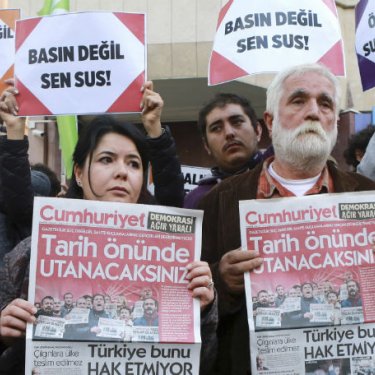Cumhuriyet journalists facing up to 43 years in prison

Under an indictment issued today, 19 journalists and other employees of the opposition daily Cumhuriyet could get sentences of between seven and a half and 43 years in prison for supposedly supporting “terrorist” organizations. Reporters Without Borders (RSF) regards the indictment as an “absolute disgrace” for the Turkish authorities.
It was only today that the 19 defendants learned what charges they are facing, although some have been held for the past five months.
They are accused of “membership” or “support” for the movement led by the US-based cleric Fethullah Gülen (who is accused by authorities of being behind last July’s coup attempt), for the Kurdistan Workers’ Party (PKK) and for the far-left group DHKP/C.
The indictment claims that a “radical change in the editorial line” occurred when Can Dündar took over as editor in February 2015 and that Cumhuriyet thereafter supported the goals of these illegal organizations.
Criminalized editorial policy
Ten of the defendants, including the well known columnist Kadri Gürsel, editor-in-chief Murat Sabuncu and cartoonist Musa Kart have already been in pre-trial detention for the past five months. Investigative journalist Ahmet Şık joined them in prison in late December. The defendants also include interim managing editor Aydın Engin, Washington correspondent İlhan Tanir, and Dündar himself, who is now living in self-imposed exile.
“The charges brought against the staff of Cumhuriyet and the heavy sentences requested by the prosecution are absolute disgrace for the Turkish authorities,” RSF secretary-general Christophe Deloire said.
“The prosecutors are clearly criminalizing an editorial policy critical of President Erdoğan, treating it as a form of terrorism. The withdrawal of these charges and the release of the imprisoned journalists is the only appropriate option for the judicial system.”
In recent years, Cumhuriyet published a series of revelations that were embarrassing for the authorities and it became the spearhead of the independent press, now under more pressure than ever. Dündar and the newspaper’s Ankara bureau chief Erdem Gül have already been convicted over their revelations about Turkish arms deliveries to Islamist groups in Syria.
Punishing journalists with prolonged pre-trial detention
Eleven of the 19 defendants had to wait for months in prison to find out what they were charged with. After challenging the legality of their detention before Turkey’s constitutional court, and getting no response, they referred their case to the European Court of Human Rights in March.
Dozens of Turkish journalists have been detained pending trial in recent months. On 31 March, an Istanbul court ordered the release of 21 who had been in pre-trial detention for seven or eight months on charges of constituting the Gülen movement’s “media wing.”
But the decision was rescinded a few hours later, when the relatives of the journalists were already waiting outside the prison to receive them. The three judges who ordered their release were suspended yesterday.
“Keeping journalists in provisional detention for long months, without any credible explanation, has nothing to do with justice; it is a form of political punishment,” RSF’s Turkey representative, Erol Önderoğlu said. “It is high time that Turkey abandoned these practices and returned to constitutional principles guaranteeing freed of expression.”
The already disturbing media situation in Turkey, which is ranked 151st out of 180 countries in RSF’s 2016 World Press Freedom Index, has become critical under the state of emergency declared in the wake of the failed coup in July 2016.
Around 150 media outlets have been liquidated by decree and more than 100 journalists are currently detained. At least 775 press cards and hundreds of journalists’ passports have been cancelled without any judicial proceedings. And censorship of the Internet and online social networks has reached unprecedented levels.
All these measures have drastically curtailed the democratic debate in the run-up to a referendum that will be crucial for Turkey’s future and is now just two weeks away.


